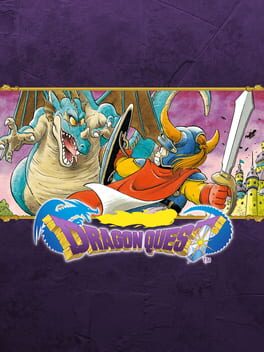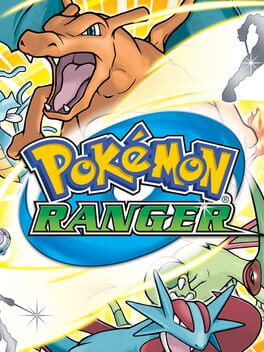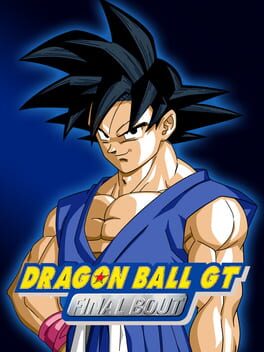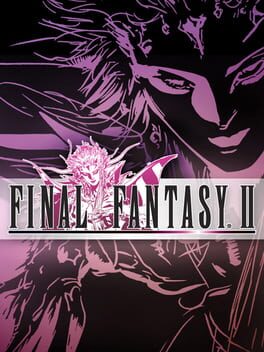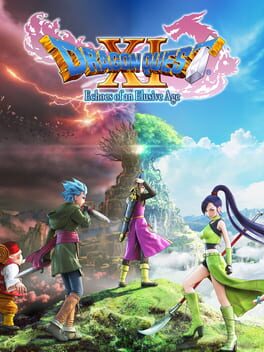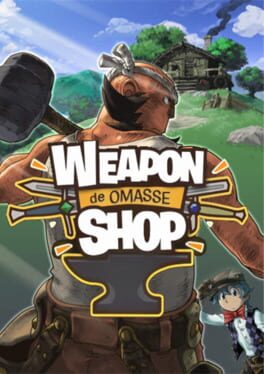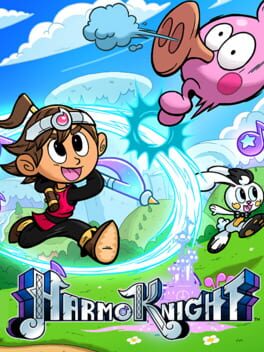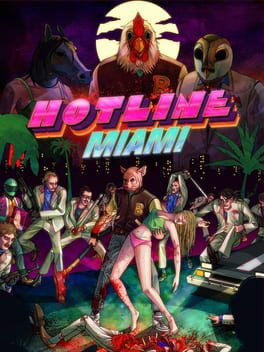el_hermano
2004
The template laid down by Dragon Quest remains undefeated in the genre of Japanese RPGs. There is a remarkable level of care that has gone into making sure that there is an appropriate level of friction between the adventure of the player and the objective of the game.
The game is fairly small and "spherical". By that I mean that there is a centerpoint that is Radatome Castle, and then there is the rest of the map that is equally long in both directions, east and west. This allows the game to justify (a poor word to choose considering they had legitimate technical limitations, but it gets the point across) making saving exclusive in Radatome Castle, at King Lars's. No distance then is great enough to be too tedious to traverse. Planning your travels is easy as well, considering you can purchase Wings of the Chimera early in the game to teleport back to Radatome Castle, and later on you can access the Return spell to use in place of the Wings. It also bears reminding that death doesn't bring any particular penalty other than interrupting your exploration and bringing you back to the centerpoint, which is farily forgiving given what was said for distances. The game is also crystal clear. The combination of the game box manual along with the initial indications from King Lars give all the tools you need to understand and clear the game. People in towns rarely gives you cryptic messages.
Ultimately, the game is lenient and fair with its player. And this lenient structure allows the game maker to be more thoughtful of the points where is wants to increase friction, rather than just make the game all friction. There are of course parts of the experience that suffer because of this. Battles become a matter of simple attacking arithmetic with no further complexity involved whatsoever, besides the Sleep spell that can come in handy in certain parts of the game where the dps race does not particularly work in the player's favour. This already highlights how random battles have been a particular point of strain in the genre since the beginning, which few have ever really dealt with correctly. Moreover the inherent small size of the world makes for a short experience, alothough for sure not unpleasant (I think it is fair to remember I have played the SNES remake which has some quality of life improvements that might have shaved off almost an hour of game time). And in particular the endgame feels a little anti-climactic, mostly because of its lack of active narrative and letting the player decide for themself the moment of ending the game.
In the end, this game embodies a level of playfulness that is perfectly encapsulated by Akira Toriyama's artistic design for the series at this particular moment in the author's artistic development. Simple, rotund, clear, uncomplicated.
The game is fairly small and "spherical". By that I mean that there is a centerpoint that is Radatome Castle, and then there is the rest of the map that is equally long in both directions, east and west. This allows the game to justify (a poor word to choose considering they had legitimate technical limitations, but it gets the point across) making saving exclusive in Radatome Castle, at King Lars's. No distance then is great enough to be too tedious to traverse. Planning your travels is easy as well, considering you can purchase Wings of the Chimera early in the game to teleport back to Radatome Castle, and later on you can access the Return spell to use in place of the Wings. It also bears reminding that death doesn't bring any particular penalty other than interrupting your exploration and bringing you back to the centerpoint, which is farily forgiving given what was said for distances. The game is also crystal clear. The combination of the game box manual along with the initial indications from King Lars give all the tools you need to understand and clear the game. People in towns rarely gives you cryptic messages.
Ultimately, the game is lenient and fair with its player. And this lenient structure allows the game maker to be more thoughtful of the points where is wants to increase friction, rather than just make the game all friction. There are of course parts of the experience that suffer because of this. Battles become a matter of simple attacking arithmetic with no further complexity involved whatsoever, besides the Sleep spell that can come in handy in certain parts of the game where the dps race does not particularly work in the player's favour. This already highlights how random battles have been a particular point of strain in the genre since the beginning, which few have ever really dealt with correctly. Moreover the inherent small size of the world makes for a short experience, alothough for sure not unpleasant (I think it is fair to remember I have played the SNES remake which has some quality of life improvements that might have shaved off almost an hour of game time). And in particular the endgame feels a little anti-climactic, mostly because of its lack of active narrative and letting the player decide for themself the moment of ending the game.
In the end, this game embodies a level of playfulness that is perfectly encapsulated by Akira Toriyama's artistic design for the series at this particular moment in the author's artistic development. Simple, rotund, clear, uncomplicated.
2006
Cute attempt at showing off the prowess of the Nintendo DS as a gaming device, with some smoke and mirrors to hide its limitations. The core of the game revolves around the adaptation of the Pokémon mainline gameplay loop in order to accomodate the introduction of the touch screen and stylus. The gameplay loop revolves around monster capturing, an offshoot of monster collecting from the main series. Pokémon are captured with the only intention of temporarily using their abilities to remove obstacles and then releasing them back to freedom.
What Ranger shines in is putting Pokémon at the center of the game. I think the mainline games have always made some mistakes in how they create an experience centered around Pokèmons, for example the exclusivity of starters leading to them having way too much staying power on your team and thus heavily affecting team composition in absence of incentives to rotate team members, or how Pokémon are observable only in tall grass. These things have been worked on slowly through generations, but Ranger took and reworked them immediately in a pleasant and rational way. Pokémon are now visible on screen during travels and a capture starts on touch; no more tall grass. The gameplay only involves player vs pokemon through the stylus, pokémon do not and cannot fight each other here. Pokémon are modelled and animated through splendid sprite work, and all have curious and neat individual animations. Pokémon are also coherent with their descriptions and stated behaviours and thus feel like proper and diverse living beings. Always a big fan of letting creatures be creatures.
In general though this level of precision in Pokémon interaction comes at the expense of most other things affecting the game. This is a small game. The main story can be finished in roughly 10 hours, while total completion of the regional pokédex might take 15 hours. The world of the game in particular is quite small. There are just 4 cities and only an handful of other locations. There are little tricks that make the game seem slightly larger than it is: for example, the camera is oddly centered on and close by the player character to create an illusory sense of breatdh of environment. Although cities are just an handful of houses and exploration involves three or four screens of walking at best, this give the illusion that exploration takes just a couple seconds longer than expected and hides, best it can, the map's general weakness. Pokémon capture sessions also take place in rather uninspired stages, which also feel comically small because the Pokémon you are trying to capture can and will run past the borders of the screen, where you cannot reach them. From a gameplay perspective, this is a fine concession to the cpu in order to even the odds against your capture possibilities, but from an experience perspective, this all leads to the game being played as if looking through a microscope. That same microscope is used for the plot of the game, a sufficiently competent work decorated with mildly entertaining and goofy characters, but nothing to write home about.
Post Edit: One thing I completely forgot to mention with respect to gameplay choices and tricks that try to manipulate your perception of the breatdh of the game: you cannot run in this game. This is small, but it's also been seriously bugging me during the whole 10 hours of gameplay I had. Running and faster-than-walking travel is somewhat of a staple in Pokémon games, through the running shoes and the bicycles. Here you get nothing of the sort. Although your walking speed is solid and brisk, it seems tailored to the small enviornments I've talked about. I don't know if I should have a legitimate expectation of being able to run in any RPG Pokémon game (take for example the Mystery Dungeon games), but I can't deny I had a few moments where I really wished I was faster. And in relation to the little world of the game, I realize if I were going any faster the game would undeniably become excessively short and unsatisftying.
What Ranger shines in is putting Pokémon at the center of the game. I think the mainline games have always made some mistakes in how they create an experience centered around Pokèmons, for example the exclusivity of starters leading to them having way too much staying power on your team and thus heavily affecting team composition in absence of incentives to rotate team members, or how Pokémon are observable only in tall grass. These things have been worked on slowly through generations, but Ranger took and reworked them immediately in a pleasant and rational way. Pokémon are now visible on screen during travels and a capture starts on touch; no more tall grass. The gameplay only involves player vs pokemon through the stylus, pokémon do not and cannot fight each other here. Pokémon are modelled and animated through splendid sprite work, and all have curious and neat individual animations. Pokémon are also coherent with their descriptions and stated behaviours and thus feel like proper and diverse living beings. Always a big fan of letting creatures be creatures.
In general though this level of precision in Pokémon interaction comes at the expense of most other things affecting the game. This is a small game. The main story can be finished in roughly 10 hours, while total completion of the regional pokédex might take 15 hours. The world of the game in particular is quite small. There are just 4 cities and only an handful of other locations. There are little tricks that make the game seem slightly larger than it is: for example, the camera is oddly centered on and close by the player character to create an illusory sense of breatdh of environment. Although cities are just an handful of houses and exploration involves three or four screens of walking at best, this give the illusion that exploration takes just a couple seconds longer than expected and hides, best it can, the map's general weakness. Pokémon capture sessions also take place in rather uninspired stages, which also feel comically small because the Pokémon you are trying to capture can and will run past the borders of the screen, where you cannot reach them. From a gameplay perspective, this is a fine concession to the cpu in order to even the odds against your capture possibilities, but from an experience perspective, this all leads to the game being played as if looking through a microscope. That same microscope is used for the plot of the game, a sufficiently competent work decorated with mildly entertaining and goofy characters, but nothing to write home about.
Post Edit: One thing I completely forgot to mention with respect to gameplay choices and tricks that try to manipulate your perception of the breatdh of the game: you cannot run in this game. This is small, but it's also been seriously bugging me during the whole 10 hours of gameplay I had. Running and faster-than-walking travel is somewhat of a staple in Pokémon games, through the running shoes and the bicycles. Here you get nothing of the sort. Although your walking speed is solid and brisk, it seems tailored to the small enviornments I've talked about. I don't know if I should have a legitimate expectation of being able to run in any RPG Pokémon game (take for example the Mystery Dungeon games), but I can't deny I had a few moments where I really wished I was faster. And in relation to the little world of the game, I realize if I were going any faster the game would undeniably become excessively short and unsatisftying.
2021
i feel i am at a point in my life where the creepypasta-influenced narrative does not cut it for me much. which is strange, because the first act of the game stands on its own two legs perfectly fine, regardless of what happens in the rest of the game when the creepypasta narrative elements are introduced. i guess this is the danger of building a game around a big reveal and then not being able to deliver.
besides that, the videogame has a sort of progression curve built around its narrative, that dictates your progression in the card game. i felt like i could never win at the card game in certain moments unless i had progressed enough in the narrative as the videogame intended. at a certain point, i could feel like the only way to approach the game was through a sort of calculated dps-maximizing strategy, where you avoid engaging with enemy monsters, or at best try to remove threats from the board if you end up facing a big beater (like a shark or a bear) that favours the opponent's dps excessively. this kind of structure could be felt in all different versions of the card game you end up playing. this would mean that the enemy could dial up their own dps as much as they wanted, considering they do not seem to have resources constraints of any kind.
i'm not sure i agree with this kind of guided structure, as it makes the card game less relevant overall to the whole videogame. or maybe i'm just poor at card games and couldn't build a deck strong enough to win certain battles earlier than intended? dunno, but after all this i don't feel like spending more time in the game getting trophies or playing through kaycee's mod.
besides that, the videogame has a sort of progression curve built around its narrative, that dictates your progression in the card game. i felt like i could never win at the card game in certain moments unless i had progressed enough in the narrative as the videogame intended. at a certain point, i could feel like the only way to approach the game was through a sort of calculated dps-maximizing strategy, where you avoid engaging with enemy monsters, or at best try to remove threats from the board if you end up facing a big beater (like a shark or a bear) that favours the opponent's dps excessively. this kind of structure could be felt in all different versions of the card game you end up playing. this would mean that the enemy could dial up their own dps as much as they wanted, considering they do not seem to have resources constraints of any kind.
i'm not sure i agree with this kind of guided structure, as it makes the card game less relevant overall to the whole videogame. or maybe i'm just poor at card games and couldn't build a deck strong enough to win certain battles earlier than intended? dunno, but after all this i don't feel like spending more time in the game getting trophies or playing through kaycee's mod.
It is often impressive what kids are able to find entertaining. Maybe they will do absolutely anything to conform and will squeeze any drip of enjoyment out of the most dull, stiff, unresponsive, uncooperative games?
The PlayStation was my first console. My dad one day came home with the iconic package holding the console, along with a literal sack of burned CDs. Sadly, no Memory Card. It's arguably one of my first memories, from pre-elementary school. The games that I distinctly remember were: Crash Team Racing, Tekken 3, Space Jam, Harry Potter and the Philosopher Stone, Dragon Ball Final Bout. In retrospect, I find it incredibly amusing to have never had a single burned copy of an RPG, say a Final Fantasy. This was a post Final Fantasy VII world, but somehow it never got in the aforementioned sack of games that came that fated day. Strange how things play out.
Dragon Ball Final Bout was a joy. The European version came with the Japanese dub and so I was able to experience at a very young age the performances of Ryusei Nakao and Norio Wakamoto and Masako Nozawa, as well as a clean 'Biggest Fight' video intro. It was likely the first time I realized the concept of 'anime'. In terms of sheer gameplay, I somehow managed to figure out how to perform special moves, which meant I could hear Nozawa or Wakamoto scream their heart out for a Kamehameha. The music was good enough to remain embedded into my brain to this day. Each daily playthrough would require a fresh start, since I couldn't save any progress. I would then spend hours trying to unlock all characters, all over again, just to get to that sweet Vegito unlock. That was all I needed.
But what is it? How did it manage to not feel completely intolerable to play when I could pop in my burned copy of Tekken 3 and play a competent 3d fighter with no hesitation? I loved Tekken 3! Couldn't I realize how much better it was? ...Apparently not? You couldn't perform a Final Flash in Tekken 3, I suppose. Sometimes, certain things are all we have. Final Bout was the only way I had, for a few years, to experience Dragon Ball outside the TV medium, the only way to control Goku with my very hands. It might really be all it's needed.
The PlayStation was my first console. My dad one day came home with the iconic package holding the console, along with a literal sack of burned CDs. Sadly, no Memory Card. It's arguably one of my first memories, from pre-elementary school. The games that I distinctly remember were: Crash Team Racing, Tekken 3, Space Jam, Harry Potter and the Philosopher Stone, Dragon Ball Final Bout. In retrospect, I find it incredibly amusing to have never had a single burned copy of an RPG, say a Final Fantasy. This was a post Final Fantasy VII world, but somehow it never got in the aforementioned sack of games that came that fated day. Strange how things play out.
Dragon Ball Final Bout was a joy. The European version came with the Japanese dub and so I was able to experience at a very young age the performances of Ryusei Nakao and Norio Wakamoto and Masako Nozawa, as well as a clean 'Biggest Fight' video intro. It was likely the first time I realized the concept of 'anime'. In terms of sheer gameplay, I somehow managed to figure out how to perform special moves, which meant I could hear Nozawa or Wakamoto scream their heart out for a Kamehameha. The music was good enough to remain embedded into my brain to this day. Each daily playthrough would require a fresh start, since I couldn't save any progress. I would then spend hours trying to unlock all characters, all over again, just to get to that sweet Vegito unlock. That was all I needed.
But what is it? How did it manage to not feel completely intolerable to play when I could pop in my burned copy of Tekken 3 and play a competent 3d fighter with no hesitation? I loved Tekken 3! Couldn't I realize how much better it was? ...Apparently not? You couldn't perform a Final Flash in Tekken 3, I suppose. Sometimes, certain things are all we have. Final Bout was the only way I had, for a few years, to experience Dragon Ball outside the TV medium, the only way to control Goku with my very hands. It might really be all it's needed.
i have conducted a bit of research before deciding to write something on this game. i have read quite a few reviews from other players. i have tried to see if there were aspects of the game that slipped from my grasp, or perspectives that shed a different light on it. to my surprise, the game was always homogeneously reviewed. the topics of discussion were always roughly the same and could be summed up in a few points: a boring and frustrating dungeon design; a derivative approach to its story; an uninspired mechanic in the form of keywords to extract plot-relevant information; a shooting for the stars approach to gameplay mechanics; a complete obfuscation of said mechanics which the player can’t ever come to understand without some sort of guide. some would bring up how the game always ranked poorly, and likely at the bottom of the lists, in every site’s final fantasy series game ranking. most would mention how they came to know the game as ‘the bad one’ of the franchise but felt like they could find some good in there and gave it a good try to possibly rediscover an hidden gem. but in hindsight all this homogeneity may not be as surprising as one may think. it is just a testament to the fact that the game truly is as dry as it may look and sound and i don’t think i can add anything of value to any of the points mentioned before. the mere statement and restatement of them, across the years and among several rereleases, makes it clear that there is not much else to catch on to.
but the value of bad videogames is in recognizing how fundamental they can be for making good games in the future. i have to respect final fantasy 2, because the game’s experimentation was foundational for finding out the correct mix of gameplay mechanics to adopt for later titles. the game’s openness to build customization (regardless of the fact that it has many elements that contrast this very feature) has without a doubt led to the rationalization that this level of flexibility is a little too excessive, but the sentiment isn’t wrong, and this led to the creation of the job class system of final fantasy 3 and 5; similarly the various fourth slot members can be clearly seen as a tough learning experience for the far more solid party rotations of final fantasy 4 and 6, where the first has a much more solid progression curve built around having Cecil as the party’s “pivot” while others rotate around him, and the latter is able to create scenarios by separating the party at times and divide the narrative into different parts. i must admit that i am not familiar with akitoshi kawazu’s work with the saga series prior to this playthrough, but i expect it to also have been tangentially influenced by the development of final fantasy 2 as well. moreover, i believe that the somber tone of this game allowed square to position itself into a different part of the role playing market with respect to its big competitor dragon quest, besides pure game mechanics, eventually bringing games likes final fantasy 4 and 6 in a few years. given all this, i am thankful for having played this game, as it gave me a sort of historical framework to better understand the progression of a game series i appreciate. so thank you, final fantasy 2, and farewell!
but the value of bad videogames is in recognizing how fundamental they can be for making good games in the future. i have to respect final fantasy 2, because the game’s experimentation was foundational for finding out the correct mix of gameplay mechanics to adopt for later titles. the game’s openness to build customization (regardless of the fact that it has many elements that contrast this very feature) has without a doubt led to the rationalization that this level of flexibility is a little too excessive, but the sentiment isn’t wrong, and this led to the creation of the job class system of final fantasy 3 and 5; similarly the various fourth slot members can be clearly seen as a tough learning experience for the far more solid party rotations of final fantasy 4 and 6, where the first has a much more solid progression curve built around having Cecil as the party’s “pivot” while others rotate around him, and the latter is able to create scenarios by separating the party at times and divide the narrative into different parts. i must admit that i am not familiar with akitoshi kawazu’s work with the saga series prior to this playthrough, but i expect it to also have been tangentially influenced by the development of final fantasy 2 as well. moreover, i believe that the somber tone of this game allowed square to position itself into a different part of the role playing market with respect to its big competitor dragon quest, besides pure game mechanics, eventually bringing games likes final fantasy 4 and 6 in a few years. given all this, i am thankful for having played this game, as it gave me a sort of historical framework to better understand the progression of a game series i appreciate. so thank you, final fantasy 2, and farewell!
many in recent years have clamored for the end of the japanese rpg as we have come to know it ever since the first dragon quest got its release and spawned a whole genealogical tree of videogames more or less inspired by it. a person as influential currently to jrpgs, and at the same time as level-headed, such as naoki yoshida tells us that this kind of games are simply not sought after anymore. even yuji horii, the very father of the series the game i am writing about is part of and one who has stuck to the traditional formula all throughout the years he's worked on the series, seems to have caved in to this apparent sentiment and has already announced that the latest iteration in the dragon quest series, in the singular teaser we have seen of the game thus far, will have in fact action elements in it.
i am not sure if it is just me not seeing the bigger picture and simply not understanding a simple fact about the industry today. people like naoki yoshida and yuji horii are many lifetimes-worth more knowledgeable about the game industry than me, i realize the fact that they must have consulted the numbers thoroughly before making statements such as the ones they have come to make. it would be strange that one of the current producers of dragon quest, yosuke saito (known also for producing various yoko taro joints), also embraces this transition when dragon quest xi has had a massive success but allows the sequel to depart from the formula that has made the series famous in the first place.
what i am getting at is that this game has perfected the classic jrpg formula and i believe that because of this it has been rewarded with an incredible, well-deserved, success. it should have been the one game that would have changed everyone's minds about the destiny of jrpgs. and apparently it didn't. i wonder what people would attribute this success of the game to then. would they say it is due to the strong cast of playable characters? well, they wouldn't come to meet most of them if they didn't like the gameplay loop enough to play long enough to meet them in the first place. is it the exploration aspect? as with many jrpgs, the game is very much streamlined before truly opening up to the player with world map mobility options. i really cannot stress enough how much it all sounds like excuses to my ears and how much i feel i am missing something very obvious that everyone else can see.
maybe it is simply the fact that, as yoshida said, a more direct control of a character's actions has a greater appeal to newer generations because that's what they've grown with, and if that crowd starts crossing over to their products then they have to adapt the next ones to this new public's expectations. but it just goes against what these games are truly about. dragon quest is successful because it is earnest, it wears its identity as a badge on its chest. the hero's journey plot. the wacky dinos and robots and gokus and trunkses. the shining sword of legend. the ultimate evil wanting to destroy the world as they know it. the casinos. the stereotypical representation of various world populations. and many more. people come to respect all that. or maybe they do not?
i am not sure if it is just me not seeing the bigger picture and simply not understanding a simple fact about the industry today. people like naoki yoshida and yuji horii are many lifetimes-worth more knowledgeable about the game industry than me, i realize the fact that they must have consulted the numbers thoroughly before making statements such as the ones they have come to make. it would be strange that one of the current producers of dragon quest, yosuke saito (known also for producing various yoko taro joints), also embraces this transition when dragon quest xi has had a massive success but allows the sequel to depart from the formula that has made the series famous in the first place.
what i am getting at is that this game has perfected the classic jrpg formula and i believe that because of this it has been rewarded with an incredible, well-deserved, success. it should have been the one game that would have changed everyone's minds about the destiny of jrpgs. and apparently it didn't. i wonder what people would attribute this success of the game to then. would they say it is due to the strong cast of playable characters? well, they wouldn't come to meet most of them if they didn't like the gameplay loop enough to play long enough to meet them in the first place. is it the exploration aspect? as with many jrpgs, the game is very much streamlined before truly opening up to the player with world map mobility options. i really cannot stress enough how much it all sounds like excuses to my ears and how much i feel i am missing something very obvious that everyone else can see.
maybe it is simply the fact that, as yoshida said, a more direct control of a character's actions has a greater appeal to newer generations because that's what they've grown with, and if that crowd starts crossing over to their products then they have to adapt the next ones to this new public's expectations. but it just goes against what these games are truly about. dragon quest is successful because it is earnest, it wears its identity as a badge on its chest. the hero's journey plot. the wacky dinos and robots and gokus and trunkses. the shining sword of legend. the ultimate evil wanting to destroy the world as they know it. the casinos. the stereotypical representation of various world populations. and many more. people come to respect all that. or maybe they do not?
among the releases of established (well, at the time) portable gaming franchises such as professor layton, yokai watch and inazuma eleven, videogame developer level-5 snuck in a tiny little innocent game by the name of weapon shop de omasse. the game is part of a compilation of small games developed by level-5 in collaboration with several artists of the gaming industry, or not, titled guild01. this game in particular was born and written by an outsider of the industry, comedian yoshiyuki hirai. it is the realization of one of the many realizations that come to a player's mind when playing through one’s typical role-playing game, that is: 'what if i played as the xxx npc?', where xxx in this case refers to 'blacksmith'. the project develops from this basic premise into trying to become a full-fledged game. it doesn't truly reach that status.
the game could be neatly divided into three parts: a shop management system, where you have to sustain your smithing efforts through purchasing the necessary materials; then a smithing rhythm minigame, where weapons are created in order to be rented by rhytmically molding a slab of iron until it achieves the desired shape; and lastly a tangential role-playing game, that you assist in by renting appropriate weapons to the various characters that need them, who you only observe from a distance through the grindcast, a vague technological device embedded into all forged weapons that captures the dialogue spoken by characters during their quests, showing it in text form in a way reminiscing social media feeds.
what bugs me the most is how disconnected the three feel from each other. the items that go into the forging process are frankly unimportant and count exactly as much as the odd fodder trinkets in role-playing games. the grindcast is the kind of solution a designer would come up with in a brainstorming session i would assume. it is one of those extremely natural, and extremely boring, solutions that somehow ended up as a main game feature because nobody found anything else more interesting to develop. first because the game does not have the balls to go all in on being a blacksmith-based videogame. second because the grindcast feed is continuously updated but only shows messages as a list and continues to be updated for the most part live, thus even during parts of the game where your concentration is required elsewhere, such as during smithing(!), you are likely to miss parts of it, defeating its purpose.
i cannot avoid thinking how these game must have garnered 2 or 3 very enthusiastic meetings among the main representatives of the development process, and then anything past that was followed by a complete deflation of ideas. hirai's writing aims at comedy by playing on common role-playing game tropes. some it tries to play straight and some it tries to subvert, and frankly all of them were unimpressive. one thing seemingly impressed me in the overall storytelling was how most stories seemed to revolve around this magical item, i think it was called the revival herb, which was tied to the evil lord. well, that whole multifaceted narrative goes simply nowhere. in line with the lack of creativity theory, one of the most bizzarre developments in the game for me was how at roughly halfway through the game we are introduced to elemental weaknesses. there was absolutely no need for this. there is already a rock-paper-scissor mechanic through certain weapon characteristics, stacking another weakness mechanic (along with status effects!) so long into the game on top of it all is devastating, and a key proof i got that the team ran out of ideas early.
what starts off as a fun-to-funny experience in the first hour is then followed by an average of 9 hours of constant repetition of that same initial gameloop, ad infinitum. in fact, the game seems to achieve some level of self-consciousness when, after you beat the final boss with every single ‘hero’ at disposal, you are thrust into an infinite final boss mode! so hey, if you are into this game, then you can play it to your heart’s content. i mentioned at the beginning that this game was 'innocent'. well, yes. if this game ever crosses your path, you look at it, smile, and then walk away, forgetting ever after that you even had the encounter in the first place.
the game could be neatly divided into three parts: a shop management system, where you have to sustain your smithing efforts through purchasing the necessary materials; then a smithing rhythm minigame, where weapons are created in order to be rented by rhytmically molding a slab of iron until it achieves the desired shape; and lastly a tangential role-playing game, that you assist in by renting appropriate weapons to the various characters that need them, who you only observe from a distance through the grindcast, a vague technological device embedded into all forged weapons that captures the dialogue spoken by characters during their quests, showing it in text form in a way reminiscing social media feeds.
what bugs me the most is how disconnected the three feel from each other. the items that go into the forging process are frankly unimportant and count exactly as much as the odd fodder trinkets in role-playing games. the grindcast is the kind of solution a designer would come up with in a brainstorming session i would assume. it is one of those extremely natural, and extremely boring, solutions that somehow ended up as a main game feature because nobody found anything else more interesting to develop. first because the game does not have the balls to go all in on being a blacksmith-based videogame. second because the grindcast feed is continuously updated but only shows messages as a list and continues to be updated for the most part live, thus even during parts of the game where your concentration is required elsewhere, such as during smithing(!), you are likely to miss parts of it, defeating its purpose.
i cannot avoid thinking how these game must have garnered 2 or 3 very enthusiastic meetings among the main representatives of the development process, and then anything past that was followed by a complete deflation of ideas. hirai's writing aims at comedy by playing on common role-playing game tropes. some it tries to play straight and some it tries to subvert, and frankly all of them were unimpressive. one thing seemingly impressed me in the overall storytelling was how most stories seemed to revolve around this magical item, i think it was called the revival herb, which was tied to the evil lord. well, that whole multifaceted narrative goes simply nowhere. in line with the lack of creativity theory, one of the most bizzarre developments in the game for me was how at roughly halfway through the game we are introduced to elemental weaknesses. there was absolutely no need for this. there is already a rock-paper-scissor mechanic through certain weapon characteristics, stacking another weakness mechanic (along with status effects!) so long into the game on top of it all is devastating, and a key proof i got that the team ran out of ideas early.
what starts off as a fun-to-funny experience in the first hour is then followed by an average of 9 hours of constant repetition of that same initial gameloop, ad infinitum. in fact, the game seems to achieve some level of self-consciousness when, after you beat the final boss with every single ‘hero’ at disposal, you are thrust into an infinite final boss mode! so hey, if you are into this game, then you can play it to your heart’s content. i mentioned at the beginning that this game was 'innocent'. well, yes. if this game ever crosses your path, you look at it, smile, and then walk away, forgetting ever after that you even had the encounter in the first place.
2012
i am not sure how the events surrounding the proposal, approval and development of this game went. supposedly, story goes, game freak allowed employees to initiate more side projects at the start of the 10s, anything other than pokémon. this shift produced a number of small, cute games that seem to be remembered by no one, relegated to and literally doomed on the 3ds e-shop. one of these projects was developed and directed by james turner, the first ever western pokémon designer at game freak and behind the designs of pokémon such as buzzwole or golurk. soon, shigeru ohmori, game designer at game freak who would later become the director for the 8th and 9th generation of pokémon games, was also brought onto the team. the game was born a platformer, but soon incorporated rhythm game mechanics and eventually became what i just finished playing, harmoknight.
why did i make all this preamble? because the game is legitimately good and it mostly came out of a development team known for making games of dubious quality for the most popular franchise in the world. they managed to create a product with an incredible artstyle (the noizoids are simply spectacular and also shoutout to lyra), a fun gameplay style (which was easily picked up even by an idiot like me who has barely even heard of the concept of 'rhythm'), impressive boss battles (i did let out a little scream when in the final boss stage i reenacted the ending to jojo battle tendency i am not going to lie) and an adequate difficulty curve (game held my hand like a baby just until i became a big boy able to walk on his own two legs). that projects like this can come out of a development team that is often derided, offended even, by critics of pokémon games (category i participate in in the same way a student spontaneously chooses to sit in the last row of class, yes i am there but please pretend i am not even here) is a sad state of affairs. i can feel vital energy pouring out of the screen here. maybe a cry for help? i hate wasted potential, it crushes your spirit. is that why the game is surprisingly mean in some of its parts? i intend that literally. during the beginning parts of the game, you are told that you are no harmoknight, that you are just a kid that has to pass the only weapon of the game, the note staff, to the true heroes of the land of melodia, although in the meantime you proceed to effortlessly beat several stages and a couple of bosses in the process. further, in the little dialogue boxes that come after the end of each stage, the other characters often direct comments to the main character tempo that belittle his efforts. only tempo's trusted buddy tappy seems to be supportive. are the developers trying to elicit some sort of emotional response from the player in order to support tempo and to generate second hand support the development teams efforts? nah. but to be honest there is something stifling creative drive at game freak. and if you want to have a feeling of what that creative drive could potentially be if let a little looser, play harmoknight. it certainly sparked an interest in me over all the other odd side projects developed at game freak.
why did i make all this preamble? because the game is legitimately good and it mostly came out of a development team known for making games of dubious quality for the most popular franchise in the world. they managed to create a product with an incredible artstyle (the noizoids are simply spectacular and also shoutout to lyra), a fun gameplay style (which was easily picked up even by an idiot like me who has barely even heard of the concept of 'rhythm'), impressive boss battles (i did let out a little scream when in the final boss stage i reenacted the ending to jojo battle tendency i am not going to lie) and an adequate difficulty curve (game held my hand like a baby just until i became a big boy able to walk on his own two legs). that projects like this can come out of a development team that is often derided, offended even, by critics of pokémon games (category i participate in in the same way a student spontaneously chooses to sit in the last row of class, yes i am there but please pretend i am not even here) is a sad state of affairs. i can feel vital energy pouring out of the screen here. maybe a cry for help? i hate wasted potential, it crushes your spirit. is that why the game is surprisingly mean in some of its parts? i intend that literally. during the beginning parts of the game, you are told that you are no harmoknight, that you are just a kid that has to pass the only weapon of the game, the note staff, to the true heroes of the land of melodia, although in the meantime you proceed to effortlessly beat several stages and a couple of bosses in the process. further, in the little dialogue boxes that come after the end of each stage, the other characters often direct comments to the main character tempo that belittle his efforts. only tempo's trusted buddy tappy seems to be supportive. are the developers trying to elicit some sort of emotional response from the player in order to support tempo and to generate second hand support the development teams efforts? nah. but to be honest there is something stifling creative drive at game freak. and if you want to have a feeling of what that creative drive could potentially be if let a little looser, play harmoknight. it certainly sparked an interest in me over all the other odd side projects developed at game freak.
2012
